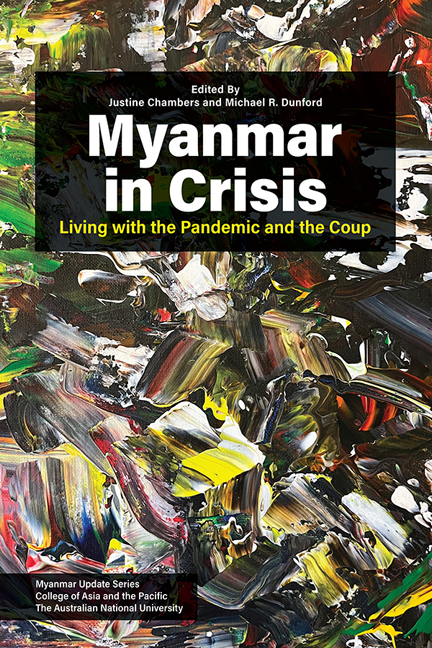5 - Myanmar under Contested Military Rule
Published online by Cambridge University Press: 01 March 2024
Summary
Since the February 2021 coup, the Myanmar junta, known as the State Administrative Council (SAC), has tried to embed its government and exert control over the population through administration, organised violence, and warfare (Callahan 2004). In response, a revolutionary movement has emerged contesting the military's legitimacy at national levels and resisting their authority at sub-national levels using violent and non-violent tactics.
This paper provides a contemporary snapshot of contested military rule in Myanmar more than a year after the coup d’etat, using evidence up to August 2022. First, it charts Myanmar's reordered political context. Second, it analyses overlapping realms of national contest over who has the legitimacy to govern between the junta and parallel National Unity Government (NUG), and the historically contested structure of the Myanmar state with new movements for democratic federalism. Third, it analyses the mix of new and old conflict dynamics, including waves of guerrilla warfare across once-peaceful areas in the Bamar heartland. Fourth, it introduces new evidence to examine changes to subnational contests for authority, including new practices of local governance by resistance forces, the post-coup expansion of territory for ethnic resistance organisations (EROs), and contested administration by the junta.
In this disrupted era, resistance to military rule and coercion has a new cast of characters and multi-ethnic alliances. While the military has consolidated and restructured control over the central state apparatus, this paper argues that subnational and local authority has become more complex and contested than ever before, including in the Bamar heartland. The post-coup political landscape is one of altered power struggles, revolutionary contests, civil disobedience, and increased conflict intensity which shows no signs of abating.
METHODOLOGY
The new realities of Myanmar's post-coup environment provide unique security challenges for international and local researchers. This paper draws on new qualitative research conducted in Yangon Region, Sagaing Region, Rakhine State, Mon State, and Northern Shan State by Myanmar researchers between November 2021 and February 2022. A template of case study questions was prepared and shared with researchers who conducted semi-structured key informant interviews in Myanmar language with known contacts in different sites. Much of the research was done through safe electronic practices to avoid meeting in public places. For their safety, the researchers are anonymous.
- Type
- Chapter
- Information
- Myanmar in CrisisLiving with the Pandemic and the Coup, pp. 95 - 124Publisher: ISEAS–Yusof Ishak InstitutePrint publication year: 2023

